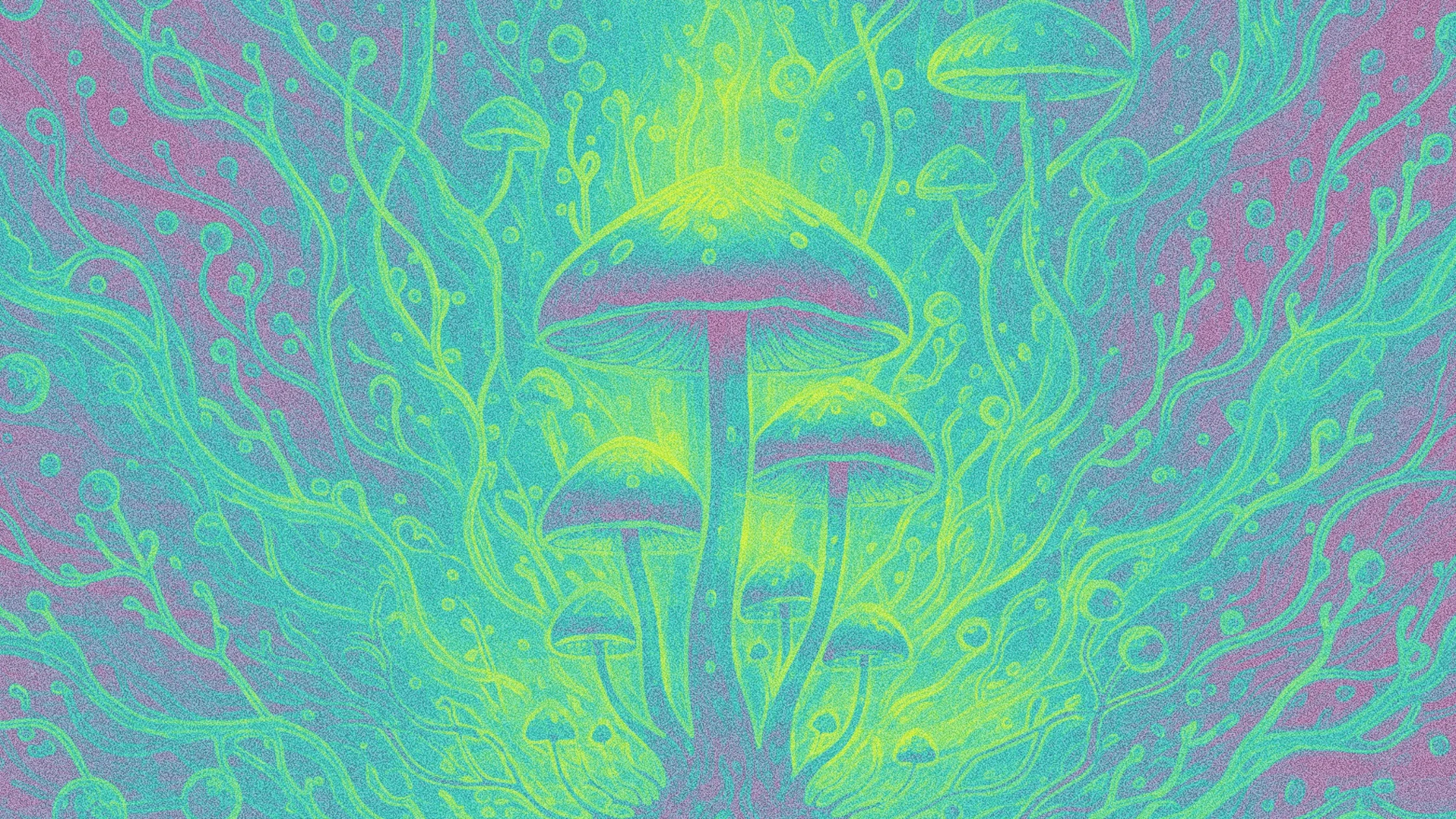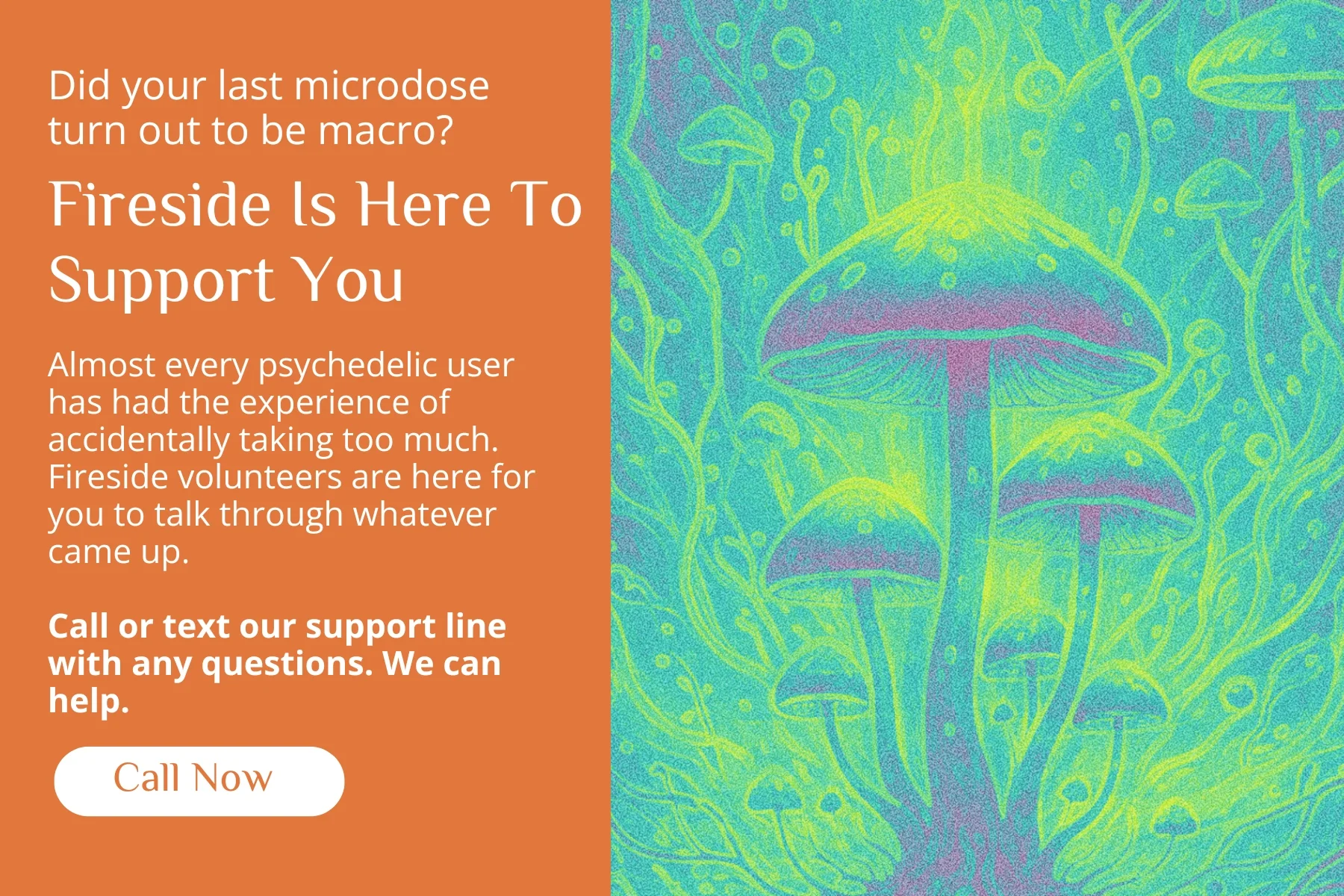Microdosing: What We’re Hearing on the Fireside Support Line
At Fireside Project, we’ve had over 1,200 conversations and counting related to microdosing. People call our free, confidential Psychedelic Support Line during and after their microdose experiences for support and to ask questions. Sometimes, they are confused about how repeated low doses of psychedelics fit into their mental health or wellness journey.
Fireside Project does not encourage people to have psychedelic experiences, including microdosing, nor do we help people decide whether to microdose, which substance(s) to microdose with, or which dosage to take. But what our volunteers can do is listen and provide emotional support.
What Is Microdosing?
Microdosing refers to the practice of taking very small, sub-perceptual amounts of a psychedelic substance, most often psilocybin (the active compound in “magic mushrooms”) or LSD, on a semi-regular schedule. These amounts are typically so small that they do not cause hallucinations or the full psychedelic effects associated with a “trip.” Instead, the goal is to experience subtle shifts in mood, focus, energy, or emotional awareness that may support wellbeing over time.
People approach microdosing in different ways. Some follow structured schedules, such as dosing every three days or a few times per week, while others experiment intuitively. The intention behind microdosing can also vary: some people seek relief from depression or anxiety, others aim to enhance creativity or mindfulness, and many are simply curious about deepening self-awareness.
Because potency and individual sensitivity differ widely, a dose that feels subtle for one person might feel stronger for another. That’s why microdosing is often described as a practice of observation and self-tuning rather than a fixed formula. It involves paying attention to one’s mental, emotional, and physical state and adjusting thoughtfully. Fireside Project supports this reflective process through harm reduction, emphasizing safety, self-compassion, and integration rather than prescriptive advice.
Some Stats and Common Themes
Out of more than 30,000 total contacts to our free support line, about 1 in 20 conversations mention microdosing with psychedelic substances like psilocybin mushrooms or LSD (lysergic acid diethylamide).
A few patterns have emerged:
Many callers want to discuss how microdosing makes them feel, emotionally and physically.
Some people describe improved mood, focus, or creativity, while others report unexpected intensity, what volunteers sometimes hear as “micro becoming macro.”
Callers frequently share that they began microdosing after reading about potential benefits in early research studies or hearing positive stories from friends or online communities.
These conversations center on meaning-making and emotional processing, rather than the logistics of microdosing itself.
Fact Check: What We Know About Possible Benefits
Scientific interest in psychedelic microdosing has grown rapidly in recent years. Early placebo-controlled and randomized controlled trials suggest potential effects on mood, cognition, and social connectedness, though findings in microdosing research are mixed and often preliminary.
Many controlled studies suggest that any reported improvements in mood, focus, or creativity may be largely explained by the placebo effect—that is, by participants’ expectations and mindset rather than the pharmacological impact of the microdose itself.
A number of randomized, double-blind studies have found no significant difference between microdosing groups and placebo groups on outcomes such as mood, anxiety, or cognitive performance. Other studies note that participants believe they are benefiting—feeling lighter, more open, or more connected—even when the active compound is indistinguishable from a placebo.
Researchers have explored:
Mood and cognition: Some participants report feeling lighter, more connected, or less anxious.
Behavioral effects: Early anecdotes point to improvements in creativity and focus.
Neural activity: Studies such as a 2025 review published in Frontiers in Neuroscience using fMRI have examined changes in functional connectivity associated with serotonergic psychedelics like psilocybin and LSD.
Changes in neural connectivity have been observed in higher-dose psychedelic studies, but translating these effects to the microdosing range remains speculative. For now, experts generally agree that the evidence is preliminary at best, and that more rigorous, long-term research is needed before drawing conclusions about safety, efficacy, or optimal protocols.
At Fireside Project, we hold space for both the science and the lived experience. Whether a person’s shifts arise from neurochemistry, intention, self-reflection, or the set and setting in which they find themselves, our focus remains the same: supporting them in exploring their process safely, with curiosity and compassion.
Microdosing With Different Psychedelic Compounds & Notes On Integration
Most callers who mention microdosing talk about psilocybin mushrooms or LSD. A smaller number mention mescaline, DMT, or ketamine at sub-perceptual levels.
People often ask about how different compounds feel, how long effects last, and what to do if a small dose becomes a large trip.
That’s where our volunteers come in. When someone feels overwhelmed or anxious, we provide real-time, peer-based emotional support, helping them ground, breathe, and reorient to safety.
Unlike a single large-dose journey, microdosing often unfolds gradually. The experiences are subtle, and insights may build over time rather than arriving all at once.
People reaching out to Fireside sometimes say they’re unsure how to interpret or integrate what they’re feeling—especially when mood, energy, or perception shifts occur over days or weeks.
That’s where Fireside-Certified™ Psychedelic Coaching can help. Our trained coaches help clients reflect on emotional changes. They help clients notice patterns and build healthy habits during their psychedelic exploration.
If you’re curious about structured, one-on-one support, Fireside offers a free consultation with a Fireside-Certified™ coach of your choice to see if coaching is right for you.
How the Fireside Support Line Helps
One common reason people contact the Support Line is when a microdose unexpectedly leads to a full psychedelic experience. Even tiny differences in potency or set and setting can transform a mild shift into a much more immersive journey.
Our volunteers help callers navigate these moments with calm reassurance. We remind them that their experiences are valid, temporary, and meaningful, and that grounding in breath, body, and trust can ease the process.
If this happens to you, know that you’re not alone, and that it’s okay to reach out for help, whether you’re in the middle of an experience or reflecting afterward.
Fireside’s free, confidential Psychedelic Support Line is available by phone or app. People reach out to talk through psychedelic experiences of all kinds—including microdosing, challenging journeys, and integration questions.
Our volunteers don’t give medical or dosing advice. Instead, they provide peer-based emotional support grounded in compassion, confidentiality, and harm reduction.
If you’re curious, anxious, or processing a psychedelic experience, you can connect anytime:
Call or text the Fireside Support Line: 62-FIRESIDE (623-473-7433)
Download the Fireside Project app on iOS or Android
Frequently Asked Questions
“Is microdosing safe?”
There’s limited research on the long-term safety of microdosing psychedelics, with one 2024 review citing 14 studies. Fireside Project does not give medical advice. We encourage anyone thinking about microdosing to research carefully and talk to therapists or other trusted health professionals.
“Can the Fireside Support Line tell me how much to take?”
No. Fireside volunteers do not offer dosage or medical guidance. They can, however, provide support if you’re feeling uncertain, anxious, or overwhelmed.
“What if my microdose turns into a full trip?”
You can call or text the Fireside Support Line for real-time peer support. Our volunteers are trained to help people ground and move through these moments safely and compassionately.



